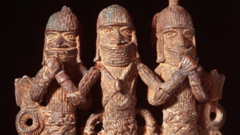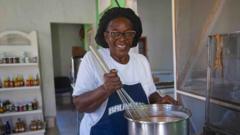Attiéké, a cherished food in Ivory Coast, has been recognized by UNESCO as part of the intangible cultural heritage, signifying its historical significance and cultural importance across West Africa.
Attiéké Celebrated as Ivory Coast's Intangible Cultural Heritage by UNESCO

Attiéké Celebrated as Ivory Coast's Intangible Cultural Heritage by UNESCO
The traditional dish, derived from cassava, showcases the cultural richness and daily life of communities in Ivory Coast.
Ivory Coast's beloved staple, attiéké, made from fermented cassava flour, has officially earned its place on UNESCO's prestigious list of intangible cultural heritage. This famous dish, often referred to as “Ivorian couscous,” is typically enjoyed with grilled fish and is a familiar presence at breakfast, lunch, and dinner across the region.
The origins of attiéké trace back centuries to the coastal areas of Ivory Coast, but its popularity has since spread throughout West Africa. During the 19th session on safeguarding intangible cultural heritage held in Paraguay, Ivory Coast’s UNESCO delegate Ramata Ly-Bakayoko highlighted the dish’s deep historical roots in community life, noting its role in various ceremonies including weddings, baptisms, funerals, and community gatherings.
More than just a meal, attiéké serves as a source of livelihood, particularly for many women who traditionally produce it. The time-honored process of making attiéké is labor-intensive, taking several days and involving numerous steps that have been passed down through generations. The preparation involves peeling and grating cassava roots, followed by pressing the pulp to remove starch, and finally steaming and drying it to create the finished product.
At local markets, attiéké is sold in plastic bags, each containing a single ball of this beloved dish. Ms. Ly-Bakayoko emphasized that attiéké embodies the cultural connection from one generation to the next, with recipes and techniques being shared between mothers and daughters. As such, it stands as a pillar of identity for both individuals and the nation of Ivory Coast as a whole.
UNESCO's inclusion of attiéké highlights the need to protect vulnerable cultural practices, reminding us of their significance to humanity. While this recognition brings pride, attiéké has also stirred controversy; an incident in 2019 saw outrage when a foreigner won an award using the Ivorian dish at an agricultural show, reflecting the complexities surrounding cultural heritage. In response to potential misrepresentation, the African Regional Intellectual Property Organization has even implemented a collective trademark to safeguard the name "attiéké," ensuring it remains exclusively tied to its Ivorian origins.
The recognition of attiéké mirrors broader efforts to preserve regional culinary and cultural practices, showcasing its delicious and tangy essence that strengthens the identity of the Ivorian people.




















